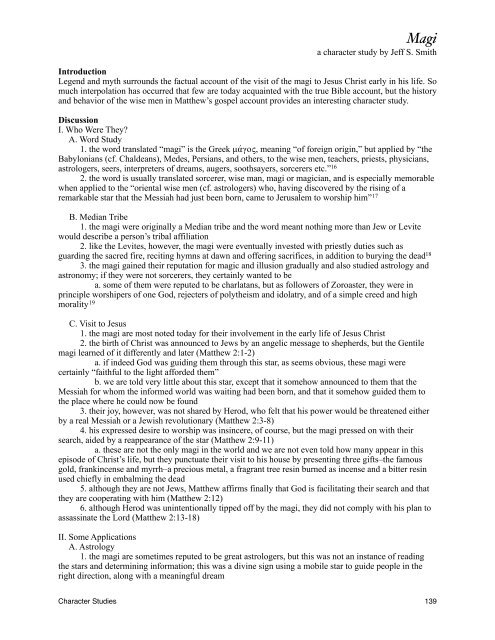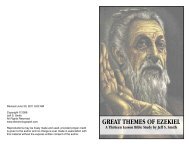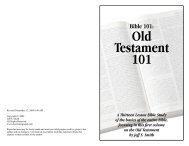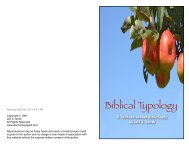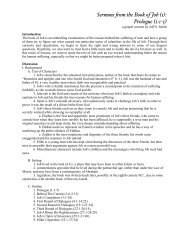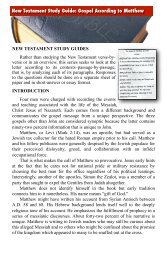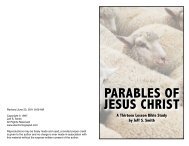Character Studies - ElectronicGospel
Character Studies - ElectronicGospel
Character Studies - ElectronicGospel
- No tags were found...
You also want an ePaper? Increase the reach of your titles
YUMPU automatically turns print PDFs into web optimized ePapers that Google loves.
Magia character study by Jeff S. SmithIntroductionLegend and myth surrounds the factual account of the visit of the magi to Jesus Christ early in his life. Somuch interpolation has occurred that few are today acquainted with the true Bible account, but the historyand behavior of the wise men in Matthew’s gospel account provides an interesting character study.DiscussionI. Who Were They?A. Word Study1. the word translated “magi” is the Greek ma/gov, meaning “of foreign origin,” but applied by “theBabylonians (cf. Chaldeans), Medes, Persians, and others, to the wise men, teachers, priests, physicians,astrologers, seers, interpreters of dreams, augers, soothsayers, sorcerers etc.” 162. the word is usually translated sorcerer, wise man, magi or magician, and is especially memorablewhen applied to the “oriental wise men (cf. astrologers) who, having discovered by the rising of aremarkable star that the Messiah had just been born, came to Jerusalem to worship him” 17B. Median Tribe1. the magi were originally a Median tribe and the word meant nothing more than Jew or Levitewould describe a person’s tribal affiliation2. like the Levites, however, the magi were eventually invested with priestly duties such asguarding the sacred fire, reciting hymns at dawn and offering sacrifices, in addition to burying the dead 183. the magi gained their reputation for magic and illusion gradually and also studied astrology andastronomy; if they were not sorcerers, they certainly wanted to bea. some of them were reputed to be charlatans, but as followers of Zoroaster, they were inprinciple worshipers of one God, rejecters of polytheism and idolatry, and of a simple creed and highmorality 19C. Visit to Jesus1. the magi are most noted today for their involvement in the early life of Jesus Christ2. the birth of Christ was announced to Jews by an angelic message to shepherds, but the Gentilemagi learned of it differently and later (Matthew 2:1-2)a. if indeed God was guiding them through this star, as seems obvious, these magi werecertainly “faithful to the light afforded them”b. we are told very little about this star, except that it somehow announced to them that theMessiah for whom the informed world was waiting had been born, and that it somehow guided them tothe place where he could now be found3. their joy, however, was not shared by Herod, who felt that his power would be threatened eitherby a real Messiah or a Jewish revolutionary (Matthew 2:3-8)4. his expressed desire to worship was insincere, of course, but the magi pressed on with theirsearch, aided by a reappearance of the star (Matthew 2:9-11)a. these are not the only magi in the world and we are not even told how many appear in thisepisode of Christ’s life, but they punctuate their visit to his house by presenting three gifts–the famousgold, frankincense and myrrh–a precious metal, a fragrant tree resin burned as incense and a bitter resinused chiefly in embalming the dead5. although they are not Jews, Matthew affirms finally that God is facilitating their search and thatthey are cooperating with him (Matthew 2:12)6. although Herod was unintentionally tipped off by the magi, they did not comply with his plan toassassinate the Lord (Matthew 2:13-18)II. Some ApplicationsA. Astrology1. the magi are sometimes reputed to be great astrologers, but this was not an instance of readingthe stars and determining information; this was a divine sign using a mobile star to guide people in theright direction, along with a meaningful dream<strong>Character</strong> <strong>Studies</strong>! 139


